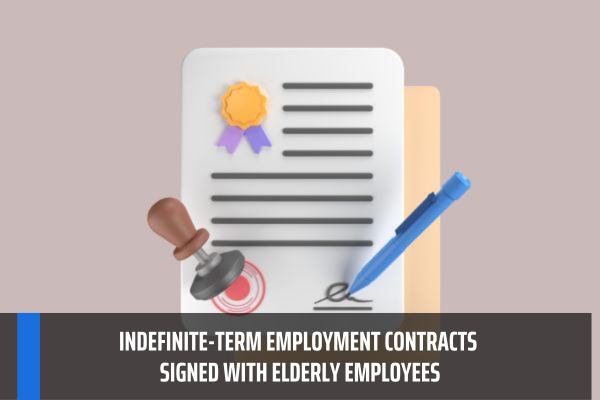What is the content of indefinite-term employment contracts signed with elderly employees in Vietnam?
- When employing an elderly person in Vietnam, may both parties agree on conclusion of an indefinite-term employment contract?
- What is the content of indefinite-term employment contracts signed with elderly employees in Vietnam?
- Vietnam: What jobs does the state encourage using elderly employees to do?
When employing an elderly person in Vietnam, may both parties agree on conclusion of an indefinite-term employment contract?
Pursuant to Clause 1, Article 149 of the 2019 Labor Code as follows:
Employment of elderly people
1. When an elderly person is employed, both parties may agree on conclusion of multiple fixed-term employment contracts.
2. In case a person who is receiving retirement pension under the Law on Social Insurance enters into a new employment contract, he/she shall receive salary and other benefits prescribed by law and the employment contract in addition to the benefits to which they are entitled under the pension scheme.
3. Employer must not assign elderly employees to do laborious, toxic or dangerous works, or highly laborious, toxic or dangerous works that are harmful to their health, unless safety is ensured.
4. Employers are responsible for taking care of the health of elderly employees at the workplace.
Accordingly, the above regulations do not limit or prohibit the case of entering into an indefinite-term contract with an elderly employer.

What is the content of indefinite-term employment contracts signed with elderly employees in Vietnam?
What is the content of indefinite-term employment contracts signed with elderly employees in Vietnam?
According to the provisions of Clause 1, Article 21 of the 2019 Labor Code as follows:
Contents of employment contracts
1. An employment contract shall have the following major contents:
a) The employer’s name, address; full name and position of the person who concludes the contract on the employer’s side;
b) Full name, date of birth, gender, residence, identity card number or passport number of the person who concludes the contract on the employee’s side;
c) The job and workplace;
d) Duration of the employment contract;
dd) Job- or position-based salary, form of salary payment, due date for payment of salary, allowances and other additional payments;
e) Regimes for promotion and pay rise;
g) Working hours, rest periods;
h) Personal protective equipment for the employee;
i) Social insurance, health insurance and unemployment insurance;
k) Basic training and advanced training, occupational skill development.
2. If the employees’ job is directly related to the business secret, technological know-how as prescribed by law, the employer has the rights to sign a written agreement with the employee on the content and duration of the protection of the business secret, technology know-how, and on the benefit and the compensation obligation in case of violation by the employee.
3. If the employee works in agriculture, forestry, fishery, or salt production, both parties may exclude some of the aforementioned contents and negotiate additional agreements on settlement in the case when the contract execution is affected by natural disaster, fire or weather.
4. The contents of the employment contract with an employee who is recruited to work as the director of a state-invested enterprise shall be stipulated by the Government.
5. The Minister of Labor, War Invalids and Social Affairs elaborate Clauses 1, 2 and 3 of this Article.
Accordingly, an indefinite-term employment contract signed with an elderly employee must have the following main contents:
- The employer’s name, address; full name and position of the person who concludes the contract on the employer’s side;
- Full name, date of birth, gender, residence, identity card number or passport number of the person who concludes the contract on the employee’s side;
- The job and workplace;
- Duration of the employment contract;
- Job- or position-based salary, form of salary payment, due date for payment of salary, allowances and other additional payments;
- Regimes for promotion and pay rise;
- Working hours, rest periods;
- Personal protective equipment for the employee;
- Social insurance, health insurance and unemployment insurance;
- Basic training and advanced training, occupational skill development.
Vietnam: What jobs does the state encourage using elderly employees to do?
Pursuant to the provisions of Clause 3, Article 148 of the 2019 Labor Code as follows:
Elderly employees
1. An elderly employee is a person who continues working after the age stipulated in Clause 2 Article 169 of this Labor Code.
2. Elderly employees are entitled to negotiate with their employer on reduction of reduce their daily working hours or to work on a part-time basis.
3. Employers are encouraged by the State to assign works that are suitable for elderly employees in order to uphold their right to work and ensure efficient utilization of human resources.
Accordingly, the state encourages the use of elderly workers to work in accordance with their health to ensure labor rights and effective use of human resources.
LawNet